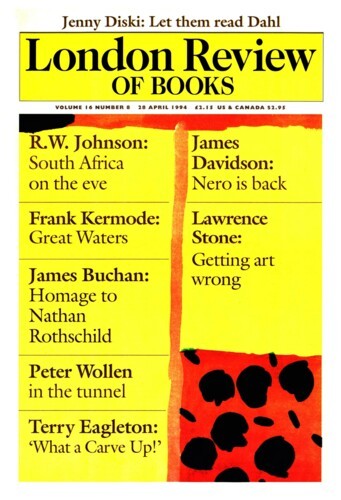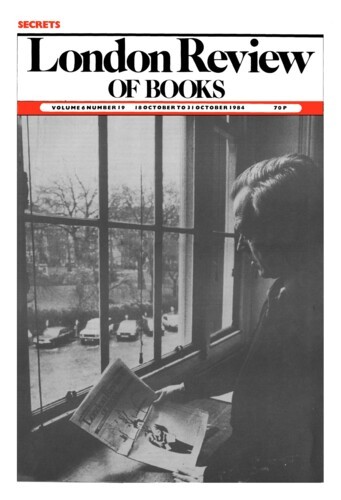Noel Malcolm
Noel Malcolm is a fellow of Gonville and Caius College, Cambridge. His De Dominis (1560-1624): Venetian, Anglican, Ecumenist and Relapsed Heretic has just been published, and he is writing a biography of Hobbes.
Citizen Hobbes
Noel Malcolm, 18 October 1984
Hobbes studies are booming. The production of books and articles on Hobbes and everything (Hobbes and Laughter; Hobbes and the American Constitution; Hobbes and Vico, or Dryden, or Hegel …) has reached record levels. Yet the essential scholarly machinery on which one might expect such a thriving industry to depend is in fact jerry-built and creaking with age: the standard edition of Hobbes’s works was published nearly a hundred and fifty years ago, and suffers from incompleteness, unreliable transcriptions and an often arbitrary choice of copy-texts. Scholars have always known that most of Hobbes’s works have complex textual histories, but they have usually shied away from the task of tackling them editorially. Now at long last Howard Warrender has produced what promises to be the first work in a new complete edition of Hobbes’s philosophical writings. The text he has tackled is one of the most complex of all, and it is not surprising to learn that his painstaking work on it took nearly twenty years to finish (though it is rather surprising that it then apparently spent more than four years in the press).
Pieces about Noel Malcolm in the LRB
Good to Think With
Helen Pfeifer, 4 June 2020
From the Renaissance to the Enlightenment, Europeans saw the Ottoman Empire not only as an opponent on the battlefield, but as an intellectual resource.
Modernity’s Bodyguard: Hobbes
Phil Withington, 3 January 2013
Four historians in a Cambridge bar, c.1998: one literary, a second legal, the third political, and the fourth a social historian. All specialise in the 16th and 17th centuries. The social...
There’s a porpoise close behind us
Michael Dobson, 13 November 1997
How far could, or even should, a history of nonsense make sense? This is one of the questions raised by Noel Malcolm’s study of English nonsense verse – a book which is itself,...
A Perpetual Object of Hatred to All Theologians
David Wootton, 20 April 1995
Although Thomas Hobbes lived to be 91, and was one of the most famous philosophers of his day, there are only 211 surviving letters to or from him. This compares with 3656 to or from Locke, some...
What is a Bosnian?
John Fine, 28 April 1994
The war in Bosnia has produced a number of historical myths, all of which have proved useful to those Serbs and Croats seeking to tear Bosnia apart, for they justify the inaction of the...
Read anywhere with the London Review of Books app, available now from the App Store for Apple devices, Google Play for Android devices and Amazon for your Kindle Fire.
Sign up to our newsletter
For highlights from the latest issue, our archive and the blog, as well as news, events and exclusive promotions.


